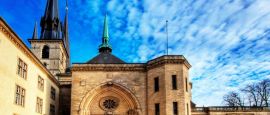Luxembourg History, Language and Culture
History of Luxembourg
Luxembourg owes its continued existence to a mixture of good fortune and good diplomacy, which have prevented it from being permanently absorbed into the territories of its larger neighbours despite the small nation’s strategic location at the heart of Europe.
By the time that Luxembourg’s independence was finally confirmed in 1867, the Grand Duchy was left with such a tiny territory that its people had to look across its borders for economic survival. Still, Luxembourg has historically experienced commercial prosperity and the country has a cosmopolitan attitude, exemplified not only by the fact that the country has the highest percentage of foreigners of any EU country, but also by the trilingual ability of its people.
During World War 2 Luxembourg sent a small group of volunteers who took part in the Normandy landings leading to the Duchy’s eventual liberation from Nazi occupation in September 1944.
A constitutional monarchy, Luxembourg’s head of state is the Grand Duke – currently Henri – and since 2011 a system of absolute primogeniture has been in place permitting legitimate female descendants to be included in the line of succession.
Luxembourg was a founder member of the European Community (having previously formed close economic ties with the Netherlands and Belgium) and was host to the European Parliament until its move to Brussels and Strasbourg. It remains the home of the Secretariat of the European Parliament. Luxembourg is in the mainstream on the current EU issues of monetary union, EU expansion, social policy and immigration and adopted the Euro upon its inception.
Domestic politics are typical of Western European nations, with Christian Democrat and Socialist parties and a centrist Parti Démocratique (PD) represented in the National Assembly. More recently, the Greens and the right-wing Action Committee for Democracy and Pensions Justice (ADR) have also been represented and the current government is a coalition of the Parti Démocratique, the Greens and the Luxembourg Socialist Workers’ Party.
Luxembourg enjoys the world’s highest GDP per capita and in 2016 its citizens have either visa-free or visa-on-arrival access to 172 countries.
Did you know?
• As a result of Grand Duke Henri’s refusal to ratify a law to legalise euthanasia in 2008, the constitution was changed so that laws pass into statute without the Grand Duke’s assent.
• Prime Minister Xavier Bettel is openly gay, the first Luxembourg Prime Minister to be so.
• Luxembourg won an Oscar in 2014 for the animated short film Mr Hublot.
Language in Luxembourg
Lëtzeburgesch, a German-Moselle-Frankish dialect, became the third officially recognised national language in 1984, joining French and German. Native-born Luxembourgers are trilingual. French and German are generally used for administrative and commercial purposes, and in the media, but many nationals will use Lëtzeburgesch at home and when socialising with one another. Reflecting the international make up of Luxembourg City and the fact that many residents are not native-born, French is the most common lingua franca in the capital. Many Luxembourgers also speak excellent English, especially in areas frequented by tourists.




 You know where
You know where